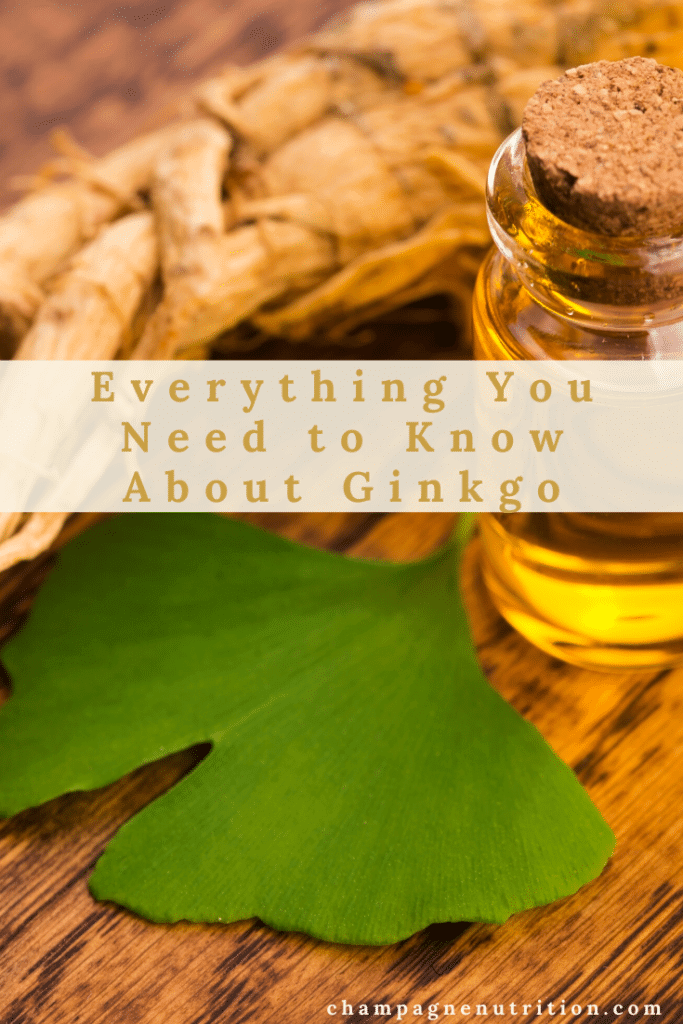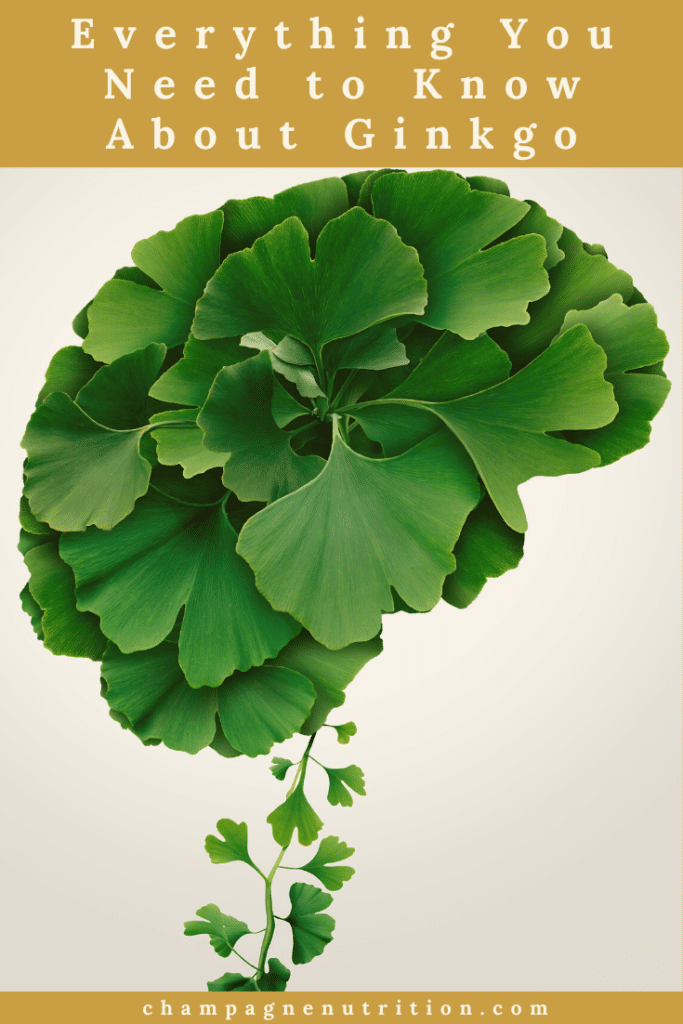Everything you need to know about Ginkgo
April 27, 2017 by Ginger Hultin MS RDN
Do you ever find yourself struggling to concentrate? Maybe you experience the occasional brain fog and you have trouble remembering things. Productivity and time management are two areas that I strive to optimize in my life, and I don’t know about you but I don’t have the time to waste stuck in a brain fog all day. So, if you are looking for ways to support your mental clarity consider trying Ginkgo. Ginkgo not only supports cognitive function but also has many other health benefits as well. Have you heard about ginkgo? Well, you’re in luck because this article will teach you everything you need to know about ginkgo!
About Ginkgo
The herb Ginkgo biloba, or ginkgo for short, has been used medicinally both in Europe and the U.S. since the 1700’s and though it is one of the most frequently prescribed herbal remedies in Germany currently, there is evidence of ancient Chinese healers describing this herb’s medicinal properties. Used to treat many health conditions, ginkgo is especially used for cognitive function including for memory improvement and even for longevity, possibly because of its link to cardiovascular health support. Keep reading to learn everything you need to know about ginkgo.

Evidence-based application
I regularly contribute to a very cool health and wellness site called Foodtrients where I write about evidence-based nutrition topics and wanted to be sure to share this one on ginkgo because unlike some herbal remedies, there is a lot of available scientific research on ginkgo. The best research exists on ginkgo for reducing anxiety and improving cognitive function though there are many reasons people use this herb medicinally. It also contains antioxidant, antibacterial, anti-cancer, and antiviral properties because of its compounds called ginkgo flavonol glycoside and terpenoids.
Cognitive benefits
A collection of research has shown that ginkgo may be able to modestly improve memory and speed of cognitive processing even in those with no previous complaints of memory impairment. There have been many studies done with ginkgo on Alzheimer’s, vascular and other dementias that have shown stabilization and even some improvement in this population. Overall, the current evidence suggests that ginkgo may benefit cognitive performance and activities of daily living in the treatment of dementia. Scientists do note that some studies on this area of health should be better constructed so more research is needed to make further conclusions.
Additional health benefits
Other reasons to take ginkgo include eye health with improvements observed for patients with diabetic retinopathy, glaucoma, and age-related macular degeneration. Ginkgo has been linked to longevity perhaps because of its use in supporting cognitive function as well as promoting cardiovascular health. Studies have shown promise for use in patients with peripheral artery disease and high blood pressure. Whether it will extend life or not, it has also been used to increase quality of life including decreasing pain and reducing anxiety.
Safety and Interactions of Ginkgo
Generally, when used correctly, ginkgo is well tolerated and may cause only mild side effects, if any. Of course, it could cause an allergic reaction like any other herb or plant when consumed. Finally, use caution with medication and other herb interactions such as Xanax, antidepressants, and medications that thin the blood, lower blood pressure, or cholesterol. There is a major interaction with an antiviral medication so it is best to discuss with your healthcare provider before starting this herb with certain medications or medical conditions for safety. After learning everything you need to know about ginkgo, you still may need to consult an herbalist or naturopath for safety on this and other types of herbs.

What can you do Nutritionally?
In addition to trying a supplement like Ginkgo, there are many ways you can support your cognition and improve your overall health and longevity with food. As a dietitian, I am always looking for ways to use food as medicine. A whole-food, plant-based diet is rich in many important nutrients. Here are some of my top recommendations to support cognition, eye health, and cardiovascular disease with diet.
- Cognition: Believe it or not, the brain’s primary fuel source is glucose, so we need healthy carbohydrates in our diet. Prioritizing complex carbohydrates like our whole grains will provide additional nutrients like B Vitamins, which act as co-factors for many important reactions in the body, such as neurotransmitter synthesis. Anti-inflammatory, polyunsaturated fats like Omega 3s and 6s are also important for brain health.
- Eye health: There are many nutrients that play a role in keeping our eyes healthy. The following nutrients have been shown to help prevent the development of chronic eye diseases: lutein and zeaxanthin are two types of carotenoids found in dark leafy green vegetables, vitamin C from fruits and vegetables like strawberries and red peppers, vitamin E from various nuts and seeds, zinc from legumes, nuts and seeds, and essential fatty acids like omega 3s from flaxseeds and walnuts.
- Cardiovascular health: Support your cardiovascular system by reducing saturated fats in your diet. Increase your fiber intake with whole grains, nuts, fruits, vegetables, and legumes. Watch the sodium content of your food by reducing the processed foods in your diet. The US Dietary Guidelines suggest an intake of no more than 2,300 mg of sodium per day.
Major Takeaway
The herb Ginkgo biloba has been used for its medicinal properties for centuries. There is strong research that supports its efficacy for cognitive improvement, dementia, anxiety, eye health, and cardiovascular disease. Make sure to consult with your health care provider before taking Ginkgo for the first time to prevent any medication interactions. Lastly, don’t forget that food is medicine and you can use ginkgo along with a nutritious diet to support your overall health and wellbeing. Now that you know everything you need to know about ginkgo, go check out some of my other posts on herbs.
Want more info on herbs and natural remedies? I’ve got my 5 Foods that Don’t Deserve their Bad Reputations, Exploring the Food Trend Maca, and 5 Ways to Benefit from Nettles on the blog! Check it out.
What have your successes or challenges been with the Ginkgo biloba herb? Let me know in the comments!

Ginger Hultin,MS, RD, CSO
Thanks for visiting! If you're struggling with a cancer diagnosis, autoimmune condition, gut health problems, or even a medical mystery, nutrition can make a HUGE difference in your day-to-day life. I run a virtual, concierge private practice where I partner with my clients over time to help them improve their health through nutrition. Be sure to visit the blog for easy, plant-based, anti-inflammatory recipes and our "Resources" page for a variety of self-paced programs, books, e-books, and nutrition podcast episodes.

